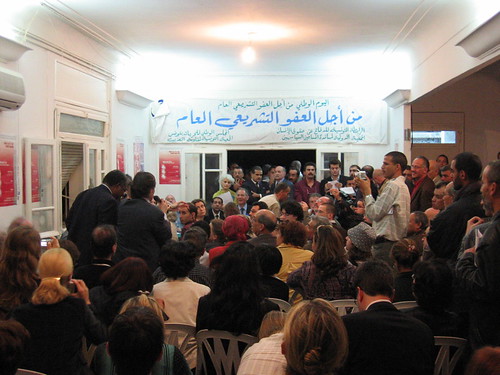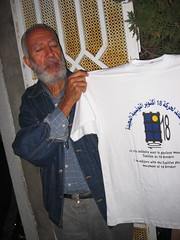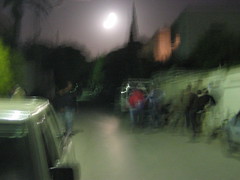Local and international human rights groups upset about the decision to hold the World Summit in Tunis have been planning for months to organize a counter-summit, a “citizen’s summit” where issues like the Internet and human rights – which have been difficult to get onto the main WSIS agenda – can be discussed.
A meeting Monday to plan the summit was disrupted by Tunisian security forces, who prevented organizers from entering the Goethe Institute, where the meeting was being held. Since then, there have been reports that human rights activists have been beaten by government-based thugs after meeting with summit attendees, and a French journalist attacked by security forces. In other words, it hasn’t looked like a welcoming climate for a citizen’s summit.

So when a group of friends and I set off to the offices of the Tunisian Human Rights League, we dropped our laptops, bags and other encumbrances in our hotel rooms beforehand, wondering if we’d find ourselves running from Tunisian security when we went to attend the opening of the Citizen’s Summit.
We had a hard time finding the office, tucked on a residential street far from the Kasbah markets or the summit hotels. But when we arrived, around 5pm, there were already at least 200 people packed into the office’s ground floor conference room, a mix of locals and summit participants. As photographers leaned over one another and people (politely) shoved past one another to get a better look, a series of speakers from Tunisian human rights groups, European parliamentarians and others took the microphone to express their support for Tunisian citizen’s basic human rights, especially freedom of speech and freedom of assembly.
 As we entered the compound, a team of t-shirt sellers urged five dinar shirts that read, in English, French and Arabic, “I am solidary with the Tunisian glorious movement of 18 October”. (I’ve yet to have anyone try to sell me a WSIS t-shirt.) The 18 October movement refers to a group of Tunisian human rights activists on a hunger strike to protest constraints on their rights in Tunis.
As we entered the compound, a team of t-shirt sellers urged five dinar shirts that read, in English, French and Arabic, “I am solidary with the Tunisian glorious movement of 18 October”. (I’ve yet to have anyone try to sell me a WSIS t-shirt.) The 18 October movement refers to a group of Tunisian human rights activists on a hunger strike to protest constraints on their rights in Tunis.
I kept waiting for a commotion in the back of the room that never came. In the immediate vicinity of the building, not so much as a police car was present. As the talks went on for over an hour, and speakers began handing microphones into the audience for comments and questions, people around me began marvelling at the fact that such a gathering could actually happen in Tunis, a nation notorious for cracking down on meetings that could be percieved as anti-government protests. Perhaps being in an international spotlight – as well as the spotlight of several TV cameras – was enough to put the Tunisian authorities on their best behavior.
 But the barriers to free expression in Tunis became all too clear as we walked out of the compound to catch taxis for dinner. Walking down the narrow street that from the human rights center to the main road, we past a block lined with tough looking men in street clothes, some on motorcycles. There was no apparent reason for thirty men to be standing on this corner of the street – no cafe, no shops of any sort – and no indication that the group was moving at all. We walked past the group, turned, and took some pictures of the moon rising over their head.
But the barriers to free expression in Tunis became all too clear as we walked out of the compound to catch taxis for dinner. Walking down the narrow street that from the human rights center to the main road, we past a block lined with tough looking men in street clothes, some on motorcycles. There was no apparent reason for thirty men to be standing on this corner of the street – no cafe, no shops of any sort – and no indication that the group was moving at all. We walked past the group, turned, and took some pictures of the moon rising over their head.
(While this was satisfying, it was probably not the wisest thing to do, a friend of mine experienced in human rights work tells me. “it just provokes them.” But it was wonderful to hear Rebecca MacKinnon say. “There’s nothing that makes me happier than the sight of thugs running.”)
This immediately caused a commotion. One man shouted and suddenly all thirty men had scattered. We returned the way we came and found them a block to the left, looking similarly aimless and menacing, a few more meters away. We decided to return to the gathering and warn people that there was a potential confrontation down the road. But, as groups poured out of the packed office into the street, it became that this sort of intimidation is run of the mill for Tunisian activists – they’d been smart enough to call for taxis ahead of time – most of the folks walking past the thugs were foreigners. As my friend wise in the ways of human rights violations pointed out, “Nobody’s getting beaten up tonight. There are people from embassies and national delegations here. It’s just a reminder to everyone that they’re being watched, all the time.”
As one of the speakers pointed out, it’s our duty to be sure that we’re all watching Tunisia, not just during this summit, but afterwards. While some of the actions taken by Tunisian authorities during the summit are ludicrious, they’re likely to be just as outrageous after WSIS moves on and the world turns away. That’s what Ben Ali wants, and that’s what the brave activists who held tonight’s summit need to make sure doesn’t happen.
I love the mental image of the thugs running when you photographed the moon, though the reality it reflects is pretty sobering. Thanks for this.
Unfortunately, I’m reading a fair number of sites that do report on journalists being beaten up, in full view of the world media. Christophe Boltanski was beaten and stabbed, and I’ve seen other incidents reported, but am having trouble finding them.
Pingback: OpenNet Initiative Blog » Blog Archive » Expression Under Repression and Tunisia’s Secret Police
Thanks for being there, Ethan.
Pingback: Global Voices Online » Blog Archive » WSIS: Defending Freedom of Speech in Tunisia
Pingback: Sabbah’s Blog » Blog Archive » A phalanx of secret police at Expression Under Repression
Pingback: Editor: Myself (Persian)
Pingback: …My heart’s in Accra » Democrats invent the remix, only three years after the Tunisians
Pingback: Tunisia: Opening prisons to the world [via GV/WITNESS] « The Hub - the global platform for human rights media and activism
Pingback: …My heart’s in Accra » What if Tunisia had a revolution, but nobody watched?
Pingback: Tunisia’s Cyberwar: Under The Radar — Securing Our eCity - Blog
Pingback: Tunisia’s Cyberwar: Under The Radar
Comments are closed.